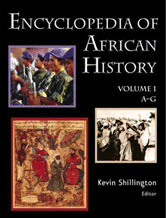
 Africa and the Americas: Culture, Politics, and History
This encyclopedia explores the many long-standing influences of Africa and people of African descent on the culture of the Americas, while tracing the many ways in which the Americas remain closely interconnected with Africa.
Africa and the Americas: Culture, Politics, and History
This encyclopedia explores the many long-standing influences of Africa and people of African descent on the culture of the Americas, while tracing the many ways in which the Americas remain closely interconnected with Africa.
 Biographical Dictionary of Modern Egypt
Covering the period from 1760 to the present, provides biodata, biographical sketches, and source material for men and women who have played a major role in Egypt's national life.
Biographical Dictionary of Modern Egypt
Covering the period from 1760 to the present, provides biodata, biographical sketches, and source material for men and women who have played a major role in Egypt's national life.
 Cassell's Peoples, Nations and Cultures
A unique and comprehensive historical guide to the world's peoples, from the earliest times to the present.
Cassell's Peoples, Nations and Cultures
A unique and comprehensive historical guide to the world's peoples, from the earliest times to the present.
 Dictionary of Languages
The essential guide to the languages of the world, comprehensively detailing languages in a clear A-Z style.
Dictionary of Languages
The essential guide to the languages of the world, comprehensively detailing languages in a clear A-Z style.
 Encyclopedia of African History
Covering the entire continent from Morocco, Libya, and Egypt in the north to the Cape of Good Hope in the south, and the surrounding islands from Cape Verde in the west to Madagascar, Mauritius, and Seychelles in the east, the eEncyclopedia is an A-Z reference resource on the history of the entire African continent.
Encyclopedia of African History
Covering the entire continent from Morocco, Libya, and Egypt in the north to the Cape of Good Hope in the south, and the surrounding islands from Cape Verde in the west to Madagascar, Mauritius, and Seychelles in the east, the eEncyclopedia is an A-Z reference resource on the history of the entire African continent.
 Encyclopedia of African History
Covering the entire continent from Morocco, Libya, and Egypt in the north to the Cape of Good Hope in the south, and the surrounding islands from Cape Verde in the west to Madagascar, Mauritius, and Seychelles in the east, the Encyclopedia is an A-Z reference resource on the history of the entire African continent.
Encyclopedia of African History
Covering the entire continent from Morocco, Libya, and Egypt in the north to the Cape of Good Hope in the south, and the surrounding islands from Cape Verde in the west to Madagascar, Mauritius, and Seychelles in the east, the Encyclopedia is an A-Z reference resource on the history of the entire African continent.
 Encyclopedia of South Africa
This authoritative, comprehensive reference work covers South Africa's history, government and politics, law, society and culture, economy and infrastructure, demography, environment, and more, from the era of human origins to the present.
Encyclopedia of South Africa
This authoritative, comprehensive reference work covers South Africa's history, government and politics, law, society and culture, economy and infrastructure, demography, environment, and more, from the era of human origins to the present.
 Encyclopedia of World Trade From Ancient Times to the Present
The definitive reference on the history of trade in all time periods. It traces the historical and contemporary interaction of trade, commerce, and culture in fascinating detail.
Encyclopedia of World Trade From Ancient Times to the Present
The definitive reference on the history of trade in all time periods. It traces the historical and contemporary interaction of trade, commerce, and culture in fascinating detail.
 A Guide to the Ancient World, H.W. Wilson
This useful companion to classical history reveals the ancient world - from Scotland to India and from Spain to the Black Sea - through the numerous sites of its history and legends.
A Guide to the Ancient World, H.W. Wilson
This useful companion to classical history reveals the ancient world - from Scotland to India and from Spain to the Black Sea - through the numerous sites of its history and legends.
 A Historical Companion to Postcolonial Literatures: Continental Europe and its Empires
Provides an integrated and authoritative body of information about the political, cultural and economic contexts of postcolonial literatures that have their provenance in the major European Empires of Belgium, Denmark, France, Germany, Italy, The Netherlands, Portugal, and Spain as well as places like Latin America and the Philippines
A Historical Companion to Postcolonial Literatures: Continental Europe and its Empires
Provides an integrated and authoritative body of information about the political, cultural and economic contexts of postcolonial literatures that have their provenance in the major European Empires of Belgium, Denmark, France, Germany, Italy, The Netherlands, Portugal, and Spain as well as places like Latin America and the Philippines
 World Politics Since 1945
Essential reading for those who need to understand the great sweeps of contemporary history.
World Politics Since 1945
Essential reading for those who need to understand the great sweeps of contemporary history.
Index of diverse open access journals from around the world, driven by a growing community, committed to ensuring quality content is freely available online for everyone.